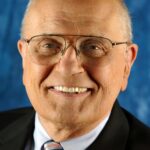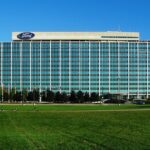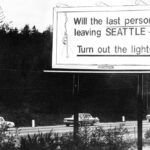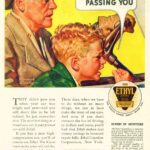 Unless you’re from Michigan you may not be aware of John Dingell, a congressman from the west side of Detroit and something of a legend on many levels. Some knew him as a friend of labor. Some as an insider with the auto industry. Some as one member of a political dynasty which persists to this day. Some as one of the pivotal figures in the transition of the National Rifle Association from hunting advocates to Second Amendment powerhouse.
Unless you’re from Michigan you may not be aware of John Dingell, a congressman from the west side of Detroit and something of a legend on many levels. Some knew him as a friend of labor. Some as an insider with the auto industry. Some as one member of a political dynasty which persists to this day. Some as one of the pivotal figures in the transition of the National Rifle Association from hunting advocates to Second Amendment powerhouse.
But John Dingell was arguably, also the most consequential environmental elected of the 20th Century. A primary sponsor of the Clean Air Act, Clean Water Act, NEPA, EPA. You name it, his name is at the top, including fuel-economy standards, removing lead from gasoline, and catalytic converters–all things that the auto industry (headquartered in his district) claimed would ‘destroy the economy’ or were technically impossible.
Seen from the lens of today’s politics, Dingell’s legacy is complex. From one end of the spectrum, he was only the most prominent member of four generations of nepotism and emblematic of of pork-loving, big government, Post-War Democrats. From the other he could seem like a ‘2A’ extremist and overtly racist. But whatever else one might say, one has to acknowledge his contributions to environmental legislation, which have saved (no exaggeration) hundreds of thousands of lives.
We believe that the main motivator of Dingell’s environmental advocacy was as simple as this: he was an ‘outdoorsy’ guy. He was no academic and had little time for abstractions. As an ardent hunter and fisher he saw first hand the damage to wildlife and the loss of habitat caused by industrial pollution. Things he could see affected him in a personal and tactile way.
Meanwhile at Sea-Tac…
What we have struggled to explain to residents near Sea-Tac Airport is that it is foolish to constantly rail against the Port or the FAA for our woes when we have so much evidence that what moves the needle on even the toughest problems are electeds–people like Dingell, willing to engage with that kind of visceral passion.
And the fact is, we currently have no electeds willing to use their influence on airport issues with that same commitment. Perhaps because none feel airport issues like Dingell felt about wildlife. That’s no dig. Electeds are people, and everyone has issues they support with their head and others they put their heart and soul into. But it’s important to recognize this fact because otherwise it leads to the notion that ‘resistance is futile’.
Also: to one degree or another, everyone of this generation (falsely) believes in an ‘all or nothing’ argument. The airport provides ‘benefits’ so dramatic that, even with acknowledged local harms, it would be foolhardy to attempt anything to mitigate or to compensate airport communities. There is simply too much at stake; for the greater good of King County, Washington, and America. Others take a realpolitik approach.
Also: why waste valuable political capital on votes that cannot be won?
According to this approach, best case for community improvement is based on some form of volunteer effort (by community members, the Port, the airlines), or one that is 100% carrots and 0% sticks. Failing that, they will pivot to the great work they are doing on other issues.
Confidence…
We believe that Dingell’s willingness to work these issues so hard also came from an optimism and confidence about his industry–the auto industry. In Detroit, people really believed that The Big 3 would reign forever. There was a saying, ‘As goes GM, so goes America.’ One can interpret that not only as a caution but also as a show of strength. With an institution that solid, one can insist on change–even if the industry howls–without worry, because their failure will not be allowed.
 Both politically and personally, Dingell understood that one could support the industry and demand things. After all, the government built all the roads and provided all the other supports which made their success possible. So we (the public) had a right to ask for something in return besides ‘jobs’ and ‘cars’.
Both politically and personally, Dingell understood that one could support the industry and demand things. After all, the government built all the roads and provided all the other supports which made their success possible. So we (the public) had a right to ask for something in return besides ‘jobs’ and ‘cars’.
And to be clear, this approach was not an overnight success. He lost many battles over many decades to achieve results we now take for granted. Sometimes you have to be willing to lose in order to eventually win.
No Confidence…

In Seattle (and Sea-Tac) people are constantly being told that every aspect of aviation, from the sublime to the ridiculous, is always on the verge of collapse. Tourism! Jobs! Safety! Frequent Flyer Miles! Everything.
Puget Sound has had so many aviation-related boom/bust cycles we consider that state of affairs normative.
With that level of precarity, so the argument goes, it would be foolish even to tinker around the edges. Instead, we should be helping aviation and tourism with as many supports as possible. To this way of thinking, a booming sector is what will speed the innovations that will (eventually) lead to cleaner/quieter communities.
Today’s aviation fibs are exactly the ones the auto industry used to slow walk innovation for decades and led to both the economic and environmental decline of cities like Detroit. And Dingell is rightly praised for recognising them for what they were (and are) and expect more.
With friends like these…
In today’s world there are many things for people of all stripes to dislike about a politician like John Dingell. And there are many things to like about all our current electeds.
But what does it say that our own Senator Cantwell is chair of the Senate Committee in charge of aviation? Our own Rick Larsen is ranking member of the analogous House committee. Our own Governor Inslee ran for President on an ‘environmentalist’ slate. What does it say when WA electeds, all at the zenith of influence, all let us down so consistently–even when there is so little cost to advocating for us?
Like Dingell, the current roster of electeds near Sea-Tac Airport are at the zenith of influence at every level of government. If ever there was a moment where electeds could be expected to make a difference for the Sea-Tac Communities, it would be now. But that has not happened.
We have met the enemy, and they is us…
And what does it say about the vast majority of local voters, that, frankly, no one is willing to call out party politics for its role in promulgating this. You can never tell anyone to go to hell because doing so might get “Voldemort” elected!
Local environmental activists tend to focus on traditional and romantic ‘open spaces’: trees, salmon, seals and C02. But Dingell understood that the real environmental impacts involve machines and systems.
Dingell would likely be ‘canceled’ today. But while he was active he was willing to use his power to make a real difference on some particularly thorny issues-to the dismay of his residents and the auto companies he represented.
We cannot imagine any of our, far less conflicted electeds pushing back on the Port of Seattle in any similar manner. That is the problem. Not the Port. Not the FAA. The problem is the people we elect, people who could do more but choose to spend their passion and political capital on other issues. We like them.; we can’t imagine voting for someone else. It’s just easier to keep blaming the Port and the FAA. That is why the airport continues to expand. We enable the electeds. And they enable the airport.
The reason to ask “Where’s my John Dingell?” is the same reason we previously asked Where’s my Clair Patterson? The failure of progress on airport issues since the 1970’s comes down to expectations, not economics or engineering.
Some lessons for activists…
 It is not that change is impossible at Sea-Tac. But it requires someone willing to insist that the airport can do better–even when that industry says it’s already doing its absolute best. Just as it required someone like Clair Patterson to insist that lead needed to be properly measured–even when the industry told the public there was no point, even in measuring it properly, because the product was so safe you could (literally) wash your face in it!
It is not that change is impossible at Sea-Tac. But it requires someone willing to insist that the airport can do better–even when that industry says it’s already doing its absolute best. Just as it required someone like Clair Patterson to insist that lead needed to be properly measured–even when the industry told the public there was no point, even in measuring it properly, because the product was so safe you could (literally) wash your face in it!
And most of all, if there’s no one with John Dingell’s willingness to buck the system, it takes you to help make one. It takes you to insist that your electeds do what they are capable of, not what causes the least amount of friction. Now.
It takes you to create both the sense of urgency and the higher expectations we need our electeds to have. Expect more. Because more is possible. A lot more.